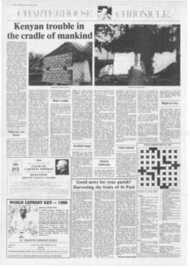Page 3, 29th January 1988
Page 3

Report an error
Noticed an error on this page?If you've noticed an error in this article please click here to report it.
Tags
Share
Related articles
Pope Addresses ‘dramatic’ Threat Of Secularisation
Is Africa The Church's Instrument Of Renewal?
Philosopher Appointed To Culture Group
Vatican Brushes Up Its Culture
The Achievement Of John Paul Ii
Poet Pope's concern for a Christian voice on culture
Peter Stanford talks to Lord St John of Fawsley about his new role as a member of the Pontifical Council for Culture.
CULTURE is a notoriously difficult word to define, both in its positive and negative aspects. Of the latter, Pope John Paul took the occasion of World Youth Day, last Sunday, to mention "modern pleasure seeking through drugs, consumerism and sex". Such practices, he opined "yield disappointment rather than real answers about the meaning of life".
The task of turning culture to the benefit to Christianity, and Christianity to the benefit of culture, is the brief of the Pontifical Council for Culture, set up five years ago by the poet Pope, John Paul II.
A new international council has just been appointed, and two weeks ago they met in Rome. From Great Britain came the former Arts Minister, Norman St John Stevas newly elevated to the House of Lords as Lord St John of Fawsley since his early retirement from the rough and tumble of the Commons at the last election.
He clearly relishes the opportunity of combining in an institutional form two of the guiding principles of his public life — his faith and his passion for the arts. He is currently Chairman of the Royal Fine Art Commission, which from its grandioese headquarters in central London has since 1924 advised philistine governments on "matters of taste and aesthetics".
"Cultural evangelisation", Lord St John readily admits, is not a task lightly embarked upon. "It is a question of having a dialogue between the Gospel and culture", and therefore of reversing the overwhelmingly secular nature of our society and its interests and pursuits.
It was Cardinal Newman in the nineteenth century who saw the death of the Christian culture in these islands and indeed worldwide Lord St John estimates. With a decline in belief, moral concensus was lost, and the Church has been pushed "to the margins of society".
What the papal council will attempt is to find "points of contact with the cultural world where Christians can make their voices heard". And Lord St John is taking culture in its broadest sense. He uses the example of contemporary morality. "The sexual revolution has come to an end in abortion and AIDS", he asserts. It's demise occurred because it mistook the nature of relationships, and placed sex where friendship should be, he thinks. Now society is more willing to listen to the positive, non judgemental message from the churches about the value of friendship.
Again when looking at youth culture, Lord St John is anxious that the council should hear the voices of the young. "We need to find out why young people are attracted to religion, and yet are repelled by the institution of the church". An element in this, he estimates, is the fact that the young are repelled by all institutions. "But that isn't answering the churches' question or need".
In welcoming the new council members Pope John Paul described their task as "complex and arduous". He might have added ill defined. But Lord St John seems already determined to draw up the intellectual parameters of his field of operation, as well as the practical possiblities.
blog comments powered by Disqus













